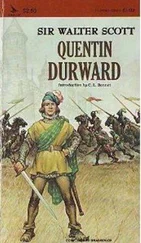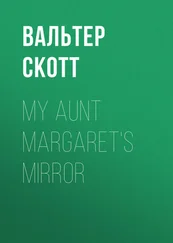Walter Scott - My Aunt Margaret's Mirror
Здесь есть возможность читать онлайн «Walter Scott - My Aunt Margaret's Mirror» весь текст электронной книги совершенно бесплатно (целиком полную версию без сокращений). В некоторых случаях можно слушать аудио, скачать через торрент в формате fb2 и присутствует краткое содержание. Жанр: Классическая проза, на английском языке. Описание произведения, (предисловие) а так же отзывы посетителей доступны на портале библиотеки ЛибКат.
- Название:My Aunt Margaret's Mirror
- Автор:
- Жанр:
- Год:неизвестен
- ISBN:нет данных
- Рейтинг книги:3 / 5. Голосов: 1
-
Избранное:Добавить в избранное
- Отзывы:
-
Ваша оценка:
- 60
- 1
- 2
- 3
- 4
- 5
My Aunt Margaret's Mirror: краткое содержание, описание и аннотация
Предлагаем к чтению аннотацию, описание, краткое содержание или предисловие (зависит от того, что написал сам автор книги «My Aunt Margaret's Mirror»). Если вы не нашли необходимую информацию о книге — напишите в комментариях, мы постараемся отыскать её.
My Aunt Margaret's Mirror — читать онлайн бесплатно полную книгу (весь текст) целиком
Ниже представлен текст книги, разбитый по страницам. Система сохранения места последней прочитанной страницы, позволяет с удобством читать онлайн бесплатно книгу «My Aunt Margaret's Mirror», без необходимости каждый раз заново искать на чём Вы остановились. Поставьте закладку, и сможете в любой момент перейти на страницу, на которой закончили чтение.
Интервал:
Закладка:
At length, there entered the middle aisle of the building a numerous party, which appeared to be a bridal one, as a lady and gentleman walked first, hand in hand, followed by a large concourse of persons of both sexes, gaily, nay richly, attired. The bride, whose features they could distinctly see, seemed not more than sixteen years old, and extremely beautiful. The bridegroom, for some seconds, moved rather with his shoulder towards them, and his face averted; but his elegance of form and step struck the sisters at once with the same apprehension. As he turned his face suddenly, it was frightfully realized, and they saw, in the gay bridegroom before them, Sir Philip Forester. His wife uttered an imperfect exclamation, at the sound of which the whole scene stirred and seemed to separate.
"I could compare it to nothing," said Lady Bothwell, while recounting the wonderful tale, "but to the dispersion of the reflection offered by a deep and calm pool, when a stone is suddenly cast into it, and the shadows become dissipated and broken." The master pressed both the ladies' hands severely, as if to remind them of their promise, and of the danger which they incurred. The exclamation died away on Lady Forester's tongue, without attaining perfect utterance, and the scene in the glass, after the fluctuation of a minute, again resumed to the eye its former appearance of a real scene, existing within the mirror, as if represented in a picture, save that the figures were movable instead of being stationary.
The representation of Sir Philip Forester, now distinctly visible in form and feature, was seen to lead on towards the clergyman that beautiful girl, who advanced at once with diffidence and with a species of affectionate pride. In the meantime, and just as the clergyman had arranged the bridal company before him, and seemed about to commence the service, another group of persons, of whom two or three were officers, entered the church. They moved, at first, forward, as though they came to witness the bridal ceremony; but suddenly one of the officers, whose back was towards the spectators, detached himself from his companions, and rushed hastily towards the marriage party, when the whole of them turned towards him, as if attracted by some exclamation which had accompanied his advance. Suddenly the intruder drew his sword; the bridegroom unsheathed his own, and made towards him; swords were also drawn by other individuals, both of the marriage party and of those who had last entered. They fell into a sort of confusion, the clergyman, and some elder and graver persons, labouring apparently to keep the peace, while the hotter spirits on both sides brandished their weapons. But now, the period of the brief space during which the soothsayer, as he pretended, was permitted to exhibit his art, was arrived. The fumes again mixed together, and dissolved gradually from observation; the vaults and columns of the church rolled asunder, and disappeared; and the front of the mirror reflected nothing save the blazing torches and the melancholy apparatus placed on the altar or table before it.
The doctor led the ladies, who greatly required his support, into the apartment from whence they came, where wine, essences, and other means of restoring suspended animation, had been provided during his absence. He motioned them to chairs, which they occupied in silence—Lady Forester, in particular, wringing her hands, and casting her eyes up to heaven, but without speaking a word, as if the spell had been still before her eyes.
"And what we have seen is even now acting?" said Lady Bothwell, collecting herself with difficulty.
"That," answered Baptista Damiotti, "I cannot justly, or with certainty, say. But it is either now acting, or has been acted during a short space before this. It is the last remarkable transaction in which the Cavalier Forester has been engaged."
Lady Bothwell then expressed anxiety concerning her sister, whose altered countenance and apparent unconsciousness of what passed around her excited her apprehensions how it might be possible to convey her home.
"I have prepared for that," answered the adept. "I have directed the servant to bring your equipage as near to this place as the narrowness of the street will permit. Fear not for your sister, but give her, when you return home, this composing draught, and she will be better to-morrow morning. Few," he added in a melancholy tone, "leave this house as well in health as they entered it. Such being the consequence of seeking knowledge by mysterious means, I leave you to judge the condition of those who have the power of gratifying such irregular curiosity. Farewell, and forget not the potion."
"I will give her nothing that comes from you," said Lady Bothwell; "I have seen enough of your art already. Perhaps you would poison us both to conceal your own necromancy. But we are persons who want neither the means of making our wrongs known, nor the assistance of friends to right them."
"You have had no wrongs from me, madam," said the adept. "You sought one who is little grateful for such honour. He seeks no one, and only gives responses to those who invite and call upon him. After all, you have but learned a little sooner the evil which you must still be doomed to endure. I hear your servant's step at the door, and will detain your ladyship and Lady Forester no longer. The next packet from the Continent will explain what you have already partly witnessed. Let it not, if I may advise, pass too suddenly into your sister's hands."
So saying, he bid Lady Bothwell good-night. She went, lighted by the adept, to the vestibule, where he hastily threw a black cloak over his singular dress, and opening the door, entrusted his visitors to the care of the servant. It was with difficulty that Lady Bothwell sustained her sister to the carriage, though it was only twenty steps distant. When they arrived at home, Lady Forester required medical assistance. The physician of the family attended, and shook his head on feeling her pulse.
"Here has been," he said, "a violent and sudden shock on the nerves. I must know how it has happened."
Lady Bothwell admitted they had visited the conjurer, and that Lady Forester had received some bad news respecting her husband, Sir Philip.
"That rascally quack would make my fortune, were he to stay in Edinburgh," said the graduate; "this is the seventh nervous case I have heard of his making for me, and all by effect of terror." He next examined the composing draught which Lady Bothwell had unconsciously brought in her hand, tasted it, and pronounced it very germain to the matter, and what would save an application to the apothecary. He then paused, and looking at Lady Bothwell very significantly, at length added, "I suppose I must not ask your ladyship anything about this Italian warlock's proceedings?"
"Indeed, doctor," answered Lady Bothwell, "I consider what passed as confidential; and though the man may be a rogue, yet, as we were fools enough to consult him, we should, I think, be honest enough to keep his counsel."
"MAY be a knave! Come," said the doctor, "I am glad to hear your ladyship allows such a possibility in anything that comes from Italy."
"What comes from Italy may be as good as what comes from Hanover, doctor. But you and I will remain good friends; and that it may be so, we will say nothing of Whig and Tory."
"Not I," said the doctor, receiving his fee, and taking his hat; "a Carolus serves my purpose as well as a Willielmus. But I should like to know why old Lady Saint Ringan, and all that set, go about wasting their decayed lungs in puffing this foreign fellow."
"Ay—you had best set him down a Jesuit, as Scrub says." On these terms they parted.
The poor patient—whose nerves, from an extraordinary state of tension, had at length become relaxed in as extraordinary a degree—continued to struggle with a sort of imbecility, the growth of superstitious terror, when the shocking tidings were brought from Holland which fulfilled even her worst expectations.
Читать дальшеИнтервал:
Закладка:
Похожие книги на «My Aunt Margaret's Mirror»
Представляем Вашему вниманию похожие книги на «My Aunt Margaret's Mirror» списком для выбора. Мы отобрали схожую по названию и смыслу литературу в надежде предоставить читателям больше вариантов отыскать новые, интересные, ещё непрочитанные произведения.
Обсуждение, отзывы о книге «My Aunt Margaret's Mirror» и просто собственные мнения читателей. Оставьте ваши комментарии, напишите, что Вы думаете о произведении, его смысле или главных героях. Укажите что конкретно понравилось, а что нет, и почему Вы так считаете.










